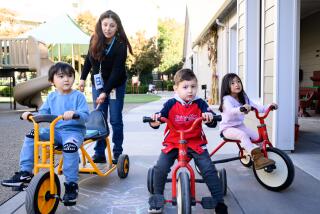Hard to Diagnose : Child’s School Phobia Afflicts Family
- Share via
The pattern is familiar--and frustrating.
It’s Sunday night. As the weekend comes to a close, your child begins to complain of a variety of ills: headache, nausea, dizziness, vomiting or diarrhea. By Monday morning, the problem is worse. Your youngster demands or pleads to stay home.
The symptoms are genuine. But you have noticed on other occasions that they disappear within a few hours after you decide to keep your child home for the day. Previous visits to the doctor have confirmed that your child does not have a physical ailment. The real problem involves something else.
It is natural for many children to dread going to school at times.Some, however, suffer from a potentially serious psychological disorder that doctors call school phobia. The condition has two major components: fear of separation from parents and abnormal dread of school-related activities.
School phobia affects the entire family. Treatments are available, but it is vital to identify the problem at an early stage because school phobia can intensify with time.
Trials of Childhood
Adults may think of childhood as a time of joyous innocence, but those early years are often filled with stressful events. For example, some children fear the dark, animals, kidnapping, neighborhood bullies or getting lost. Others seem immune to these early challenges.
It is natural for children to seek comfort from parents and, ideally, home should be a refuge from outside cares. Sometimes, however, a childhood sense of dread and dependency increases to abnormal levels.
School often is a major source of such distress. It frequently represents the first time a child must demonstrate independence. Transitional years, such as kindergarten, first grade and junior high are the most common times for the symptoms of school phobia to occur. The condition typically appears in autumn.
Symptoms can come on gradually or suddenly. Anxiety about school can be general in nature or can be related to specific people or events, such as a teacher, physical education class or using the restroom.
A child’s home environment can aggravate the problem. Closely associated with school phobia is a child’s fear that a parent will leave home or die. Dreading separation, a pleasant, cooperative child can become clinging and fearful.
Marital conflicts, the birth of a sibling, moving to a new community or a death in the family all can precipitate or aggravate the symptoms.
Some parents overcompensate with indulgence and excessive concern. Others foster a hostile relationship with their children. These responses lessen a child’s ability to be independent.
Difficult to Recognize
Children often complain about school, which makes the actual condition of school phobia difficult to diagnose. It is rare for a child to say, “I’m afraid to go to school.” More common is the insistence, “I’m sick.”
Children with school phobia often are good students. Many come from homes where education is highly valued. They tend to be compliant and eager to please adults. They differ from truant children, who do not perform well in school and tend to be defiant.
The appearance or continuation of school phobia into the teen-age years often reflects more severe problems. Drug or alcohol abuse may be involved. For adolescents, school phobia may be part of a major psychiatric illness.
Since it was first described in 1932, school phobia has been treated in various ways.
Psychoanalysis was the first approach. Later, children were hospitalized. Treatment included prolonged bed rest and home schooling. Physical activity was restricted. Experts now recognize that these approaches actually made the problem worse.
Developing Independence
Modern treatment of school phobia aims to help a child develop independence as soon as possible. Counseling is important for the child as well as for other family members.
If the home environment contributes to the problem, an escort could take the child to school. A neighbor whom the child trusts or a friend’s parent can perform this task; so can a social worker or visiting nurse. Escorting should taper off after a few days to help the child become self-sufficient.
When the child suffers from depression or severe anxiety, drug treatment may be necessary. In rare cases, children may actually benefit from temporary separation from their families. (This is more common with adolescents.) These behavioral approaches help most children overcome their phobia and return to school.
Some children will continue to be vulnerable to anxiety if other sources of fear remain. Severe school phobia may require repeated treatment over several years and include a network of family, school personnel and social service organizations.
Today’s treatment options are quite effective. Children respond well, with nearly 90% successfully returning to school.






